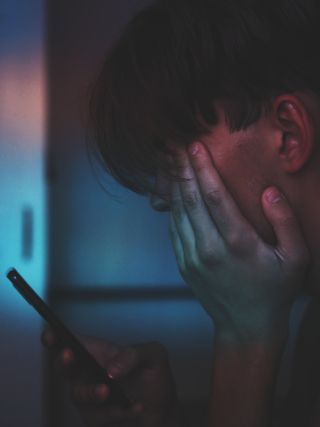Media
5 Ways Excessive Cell Phone Use Decreases Mental Health
And 3 simple ways to kick the habit today.
Posted October 30, 2023 Reviewed by Michelle Quirk
Key points
- A recent study shows excessive cell phone use results in higher anxiety, depression, and loneliness.
- Cell phone overuse also boosts health problems such as eye strain, neck and back pain, and weight gain.
- Solutions include weekly cell phone breaks, substituting creative activities, and scheduling daily blackouts.

If you’re reading this article on your cell phone, here’s some bad news: According to a recent International Journal of Environmental Research and Public Health study, excessive cell phone use results in higher levels of anxiety, depression, and loneliness.
Unfortunately (bummer alert!), the bad news doesn’t stop there. Believe it or not, excessive cell phone use increases health problems such as eye strain, neck and back pain, and weight gain.
How did this handy little device become such a big headache?
The mood destroyer in your pocket
If you’re like most folks, you love your cell phone. You entertain yourself for hours. You can watch videos and movies, play games, catch up on news, and surf the internet and social media. And, yes, you can even make phone calls with it.
There’s no doubt cell phones are a big part of everyday life; like a modern Swiss Army knife, our cell phones are also flashlights, alarm clocks, calendars, notebooks; the list goes on and on.
In fact, does anyone look out the window to check the weather anymore?
Compulsive cell phone use in action
Like all forms of compulsive activities, with increased use comes increased dependency. If your cell phone is the first thing you reach for in the morning and the last thing you put down at night, it’s time to consider the negative effect it could be having on your well-being.
Here are some problems caused by excessive cell phone use:
- You spend less time with your thoughts. Scrolling on your phone is a great way to unwind, but it could also be a way to avoid spending time with yourself and exploring wants, needs, and frustrations. Scrolling is a nice break, but too much encourages disassociation and detachment.
- You obsess about social media. It’s no secret that social media frequently manipulates images to sell you merchandise or make you feel other peoples’ lives are better than yours. Too much social media can trigger compare-and-despair reactions that leave you feeling disappointed in your life. By feeding voyeuristic tendencies, you start to obsess about other people's lives rather than focus on yours.
- You stop being creative. Cell phone overuse often pushes other creative outlets out of your life. You spend less time creating and more time consuming media.
- You socialize less. Rather than take a risk and engage in social events, you feel more comfortable staying home, living through your phone rather than interacting.
- You experience empathy burnout. Checking the news constantly and viewing troubling images or videos of violence can foster feelings of hopelessness and apathy. Staying in touch with new events is essential, but limiting your exposure is crucial to peace of mind.
How to break excessive cell phone use
Are you concerned your cell phone is consuming too much of your time? Try these three steps:
- Schedule weekly cell phone breaks. Put your phone away for a few hours once a week. Pick a day and challenge yourself to put the screen down and pick up new habits.
- Substitute creative activities. Instead of reaching for your phone, do something creative. Write, draw, dance, take photos; anything that brings creative energy back into your life.
- Create daily cell phone blackouts. There are natural times in a day to create cell phone breaks—during meals, before bed, while on vacation or socializing. You’ll be more present and focused on the moment, which will add greater satisfaction and clarity to your life.


